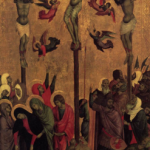
The 20th century Christian theologian and novelist, C.S. Lewis, spoke of pride as the “great sin”—perhaps because it is a vice that every human being struggles with. So much of what we think, and a fair amount of what we say and do, is rooted in pride. As Lewis pointed out (in his book, Mere Christianity),
“Pride is essentially competitive… Pride gets no pleasure out of having something, only out of having more of it than the next man. We say that people are proud of being rich, or clever, or good-looking, but they are not. They are proud of being richer, or cleverer, or better-looking than others. If someone else became equally rich, or clever, or good-looking there would be nothing to be proud about. It is the comparison that makes you proud: the pleasure of being above the rest. Once the element of competition has gone, pride has gone. That is why I say that Pride is essentially competitive in a way the other vices are not.”
Lewis’ comment is reminiscent of something the Apostle Paul encountered. In the book of 2 Corinthians, Paul described those who were speaking critically of him as being “without understanding” and as “foolish,” as evidenced by their continual need to compare themselves with others. He wrote to the Saints at Corinth: “Some people praise themselves. They say how clever they are. But we could never do that. We could not even try to be like those people. But they do not understand anything. They decide among themselves how good they are. They look at one another to see if they are better or worse.” (EEB 2 Corinthians 10:12) Paul was clearly up against some Christians in Corinth who were prideful, and he advises us to not be like them.
So, what does the Bible say about pride? And what can it teach us about the dangers of this most common of all sins? What follows are a few of the “good book’s” best counsel on the subject of pride.
In the Book of Jeremiah, we are instructed: “The Lord proclaims: the learned should not boast of their knowledge, nor warriors boast of their might, nor the rich boast of their wealth. No, those who boast should boast in this: that they understand and know me. I am the Lord who acts with kindness, justice, and righteousness in the world, and I delight in these things, declares the Lord.” (NIV Jeremiah 9:23-24) In this passage, the Lord commands us to avoid thinking we are better than others because we are smarter, stronger, or wealthier than they. While Jeremiah informs us that we should not “boast” about ourselves or our own accomplishments, we could “boast” that we “understand and know” the Lord. However, even in this, we can become subject to pride, if we’re not careful. We’ve all known certain Christians who “boast” that they are saved and, in so doing, give off an air of superiority, as though they are somehow better people than those of other religions or those who have yet to find Christ. Thus, even in this we should exhibit caution. The person who is “proud” of their personal religiosity is officially not “humble”—and trusts more in themselves than they do in Christ.
The author of the Book of James wrote, “God opposes the proud, but gives grace to the humble.” (RSV James 4:6) In the Greek, the word for “opposes” is essentially to “battle against.” Thus, James is not simply saying that God will not bless you if you are prideful. Rather, the implication of James’ declaration is that God so detests pride that He will actually push back on the prideful—not out of disdain for them, but because He loves them and wants them to cease to sin in this way. According to the Book of Deuteronomy, God allowed the Jewish people to wander “in the wilderness” for forty years in order “to humble and test” them, in the hopes that they would let go of their pride. (See NIV Deuteronomy 8:2) Similarly, James is essentially saying that God has to push back on pride, because he knows how spiritually destructive it is. He will, in His grace, forgive your weaknesses if you are humble. However, if you are prideful, He’s going to send you experiences that will show you your pride, all in the hopes that you will repent and come unto Him by changing your prideful ways.
In the 75th Psalm, we read: “I say to the boastful, ‘Do not boast,’ and to the wicked, ‘Do not lift up your horn.’” (RSV Psalm 75:4) Similarly, today we occasionally say, “Don’t toot your own horn.” While there are several theories as to the origins of this idiom, a common one is that it originated from the use of a trumpet or horn to announce to those who were “less important” that “royalty” (or someone “greater”) had arrived. So, “Don’t toot your own horn” essentially meant, ‘If you’re as great as you think, you won’t have to tell anyone. Everyone else will announce it. However, if you have to toot your own horn (or announce that “I’m kind of a big deal���), then you’re likely less significant than you know.’ In this psalm, we’re told we should avoid all boastful talk, including boasting about our sins. To “boast” is to act out of pride, and there is nothing in sin that we should be proud about.
In the book of 1 John, we’re rightly told: “Our foolish pride comes from this world, and so do our selfish desires and our desire to have everything we see. None of this comes from the Father.” (CEV 1 John 2:16) God never inspires us to be selfish, worldly, lustful, or sinful in any way. Thus, if the “lusts of the flesh, …the lusts of the eyes, [or] the pride of life” (KJV) are part of who we are, then we are not acting under the influence of the Spirit of God, and may well not have that Spirit active in our lives. Those who are following Christ and becoming like God shun such worldly things. They make no place for them in their hearts or head. John is not saying that the wonderful things of this life that God has created (or inspired humans to invent) are all evil. However, he is suggesting that we need to guard against the natural inclinations which come to each of us because of our fallen nature and our consequent “foolish pride.”
Perhaps our most important witness and word about pride comes from Jesus, who explained, “What comes from your heart is what makes you unclean. Out of your heart come evil thoughts, …meanness, … pride, and foolishness. All of these come from your heart, and they are what make you unfit to worship God.” (CEV Mark 7:10-23) According to Christ, the thoughts and desires of our hearts expose who we really are at our core. If we are prideful—which will result in “meanness,” “evil” or unkind “thoughts,” and a “foolish” attitude, this makes us “unfit to worship God” and really unworthy to call ourselves Christians.
While there are many other verses in the Bible that speak of the destructive nature of pride, the 18th Psalm summarizes the sin with this descriptive warning: “Pride leads to destruction; humility leads to honor.” (CEV Proverbs 18:12) What more do we need to know? If we are humble, God will honor us with His blessings, and others will see in us the attributes of Christ. However, if we do not regularly battle our naturally prideful nature, in the end, it will overcome us, and it will lead us down a path to personal and spiritual destruction. Thus, we would all do well to remember these words of warning from Jesus: “Whoever exalts himself will be humbled, and whoever humbles himself will be exalted.” (RSV Matthew 23:12)
Bible Verses about Pride
- EEB 2 Corinthians 10:12: "We are not bold to rank or compare ourselves with some that commend themselves: but they measuring themselves by themselves, and comparing themselves among themselves, are not wise."
- NIV Jeremiah 9:23-24: "This is what the LORD says: 'Let not the wise boast of their wisdom or the strong boast of their strength or the rich boast of their riches, but let the one who boasts boast about this: that they have the understanding to know me, that I am the LORD, who exercises kindness, justice and righteousness on earth, for in these I delight,' declares the LORD."
- RSV James 4:6: "But he gives more grace; therefore it says, 'God opposes the proud, but gives grace to the humble.'"
- NIV Deuteronomy 8:2: "Remember how the LORD your God led you all the way in the wilderness these forty years, to humble and test you in order to know what was in your heart, whether or not you would keep his commands."
- RSV Psalm 75:4: "I say to the boastful, 'Do not boast,' and to the wicked, 'Do not lift up your horn; do not lift up your horn on high, or speak with haughty neck.'"
- CEV 1 John 2:16: "These are the ways of the world: wanting everything for yourself, wanting to appear important, and wanting to enjoy the pleasures of sinful human nature. But none of these come from the Father."
- CEV Mark 7:20-23: "And then he added, 'It is what comes from inside that defiles you. For from within, out of a person’s heart, come evil thoughts, sexual immorality, theft, murder, adultery, greed, wickedness, deceit, lustful desires, envy, slander, pride, and foolishness. All these vile things come from within; they are what defile you.'"
- CEV Proverbs 18:12: "Before his downfall a man's heart is proud, but humility comes before honor."
- RSV Matthew 23:12: "Whoever exalts himself will be humbled, and whoever humbles himself will be exalted."
1/25/2024 5:22:29 AM

















